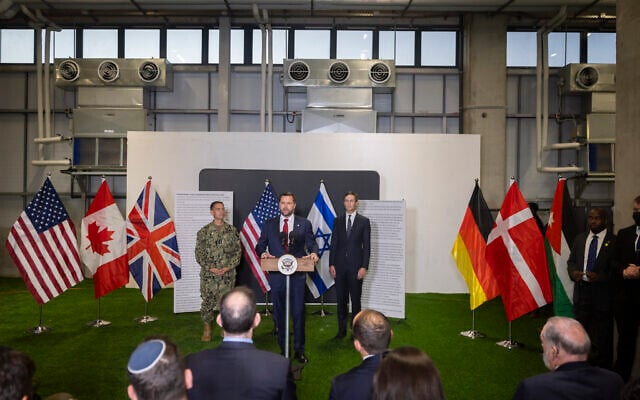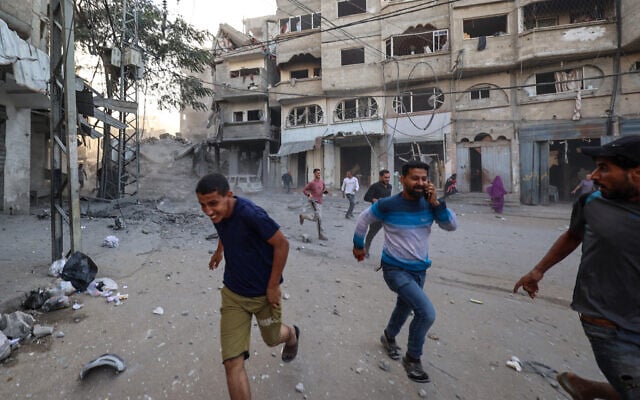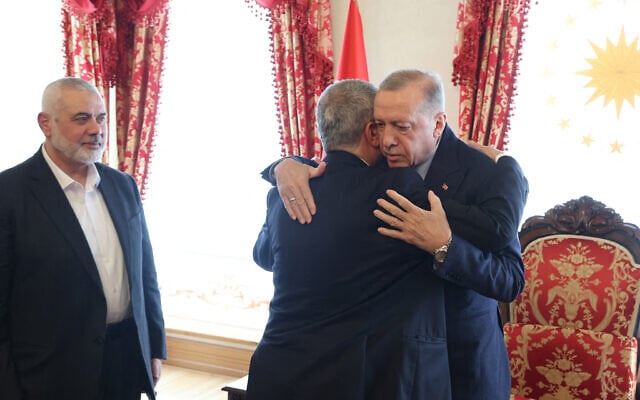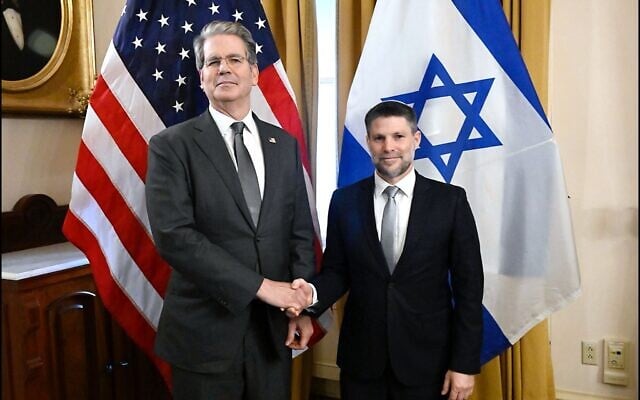United States Vice President JD Vance projected confidence on Tuesday that the ceasefire in the Gaza Strip was going to last as he paid a visit to a new US-Israel ceasefire coordination center in Kiryat Gat, southern Israel.
Vance, along with US special envoy Steve Witkoff and top Trump adviser and son-in-law Jared Kushner, was in Israel to shore up the tenuous ceasefire, ensure that all sides remained committed to its terms, and move toward further stages of the US president’s Gaza peace plan.
His visit to the center came after President Donald Trump warned earlier on Tuesday that he could send international forces into Gaza to confront Hamas over its violations of the ceasefire deal, but said he would hold off for now to give the terror group a chance to course correct.
“We are one week into President Trump’s historic peace plan in the Middle East, and things are going, frankly, better than I expected,” Vance insisted at the top of a press conference inside the coordination center.
“Here at the civilian-military cooperation center, which we are announcing the opening of, you have Israelis and Americans working hand-in-hand to try to begin the plan to rebuild Gaza, to implement a long-term peace, and to actually ensure that you have security forces on the ground in Gaza, not composed of Americans, who can keep the peace over the long term,” said Vance, flanked by Witkoff, Kushner, and US CENTCOM Commander Adm. Brad Cooper.
Along with Israeli and US soldiers and civilian contractors, the coordination center was hosting British, Canadian, German, Danish, and Jordanian soldiers, with their respective countries’ flags hanging on low poles inside the cavernous building, located in the heart of Kiryat Gat’s industrial zone.

Despite the presence of the foreign soldiers, it is not yet clear which countries will agree to send troops into Gaza to ensure lasting calm on the ground as part of a UN-mandated international stabilization force, which Vance acknowledged was still in its early planning phase.
One thing was clear, however, as Vance stressed that there would not be “American boots on the ground in Gaza,” and that the US would be tasked with providing “some useful coordination” instead.
“How do you take the Gulf Arab states plus Israel, plus the Turks, plus Indonesia?” he asked. “How do you actually get those folks to work together in a way that actually produces long-term peace? The only real mediators are the United States of America. So that’s the role that we’re going to play.”
There is “lots of work left to do,” Vance said, admitting that it would take “a very, very long time” to implement Trump’s 20-point plan in full.
Vance also projected confidence that Hamas’s failure to return many of the deceased hostages still in Gaza would be resolved, though he cautioned that this “is not going to happen overnight.
“This is difficult,” he said. “Some of these hostages are buried under thousands of pounds of rubble. Some of the hostages, nobody even knows where they are.”
“That doesn’t mean we shouldn’t work to get them,” he said, but “this is going to take a little bit of time.”
Vance will meet Prime Minister Benjamin Netanyahu in Jerusalem on Wednesday morning to discuss the next stages of Trump’s plan.
Turning his attention to one of the program’s key clauses — but one of its most thorny — Vance reiterated at the press conference that Hamas was expected to disarm and end the violence in the Gaza Strip.
“While all the [Hamas] fighters can be given some clemency, they’re not going to be able to kill each other, and they’re not going to be able to kill their fellow Palestinians,” he said, referring to the slew of public executions that Hamas has carried out against its opponents since the onset of the ceasefire.
He also criticized what he described as a “weird attitude” in American and Western media, saying that “every time something bad happens, every time that there’s an act of violence, there’s this inclination to say, ‘Oh, this is the end of the ceasefire. This is the end of the peace plan.'”
“It’s not the end,” Vance asserted. “This is exactly how this is going to have to happen when you have people who hate each other, who have been fighting against each other for a very long time. We are doing very well.”

“We’re talking about how to set up the security and humanitarian apparatus to put all this in place,” he said of the ceasefire and Washington’s vision for Gaza’s future. “But right now, where I stand, I feel confident that we’re going to be in a place where this peace lasts, where it’s durable.”
Nevertheless, he warned, “If Hamas doesn’t cooperate, then as [Trump] has said, Hamas is going to be obliterated.”
Violence broke out in Gaza earlier this week when a deadly attack on IDF troops in Rafah prompted Israel to carry out a wave of intense airstrikes before declaring hours later that it would resume upholding the truce.
Trump, earlier on Tuesday, addressed the sporadic violence in Gaza, saying that he had been fielding offers from allied nations in the Middle East to send troops into the enclave to confront Hamas over its violations of the ceasefire but had turned them down for now, to give the terror group a chance to course correct.
“Numerous of our NOW GREAT ALLIES in the Middle East, and areas surrounding the Middle East, have explicitly and strongly, with great enthusiasm, informed me that they would welcome the opportunity, at my request, to go into GAZA with a heavy force and ‘straighten out Hamas’ if Hamas continues to act badly, in violation of their agreement with us,” Trump wrote on Truth Social, his social media site.
To date, only Indonesia has publicly expressed willingness to contribute troops to a UN-mandated international force that would help secure postwar Gaza, while Turkey and Azerbaijan have privately expressed willingness to do so, officials have told The Times of Israel.
“I told these countries, and Israel, ‘NOT YET!'” Trump said. “There is still hope that Hamas will do what is right.”
????????We distributed clean water in Gaza, where Israel’s attacks and blockade have deepened the clean water crisis.
We need your support to heal the wounds.
https://t.co/Kkl7AqPy35
— IHH Humanitarian Relief Foundation (@IHHen) October 21, 2025
Still, while foreign nations have not yet committed to putting troops on the ground in Gaza, they have been making their presence known in other ways.
On Tuesday, the Turkish IHH Humanitarian Relief Foundation uploaded footage showing its personnel conducting aid activities in the Gaza Strip.
The organization was designated as a terror group by Israel in 2010 due to ties with Palestinian terror groups and in the wake of the Mavi Marmara incident, in which 10 Turkish activists were killed in a violent confrontation with Israeli naval commandos aboard a ship that aimed to break the naval blockade of Gaza.
The group published footage of water being distributed in the Strip from tankers bearing Turkish flags and IHH insignia, after first publishing footage on October 18 of its bulldozers clearing rubble in the war-torn enclave.
????????We distributed clean water in Gaza, where Israel’s attacks and blockade have deepened the clean water crisis.
We need your support to heal the wounds.
???? Online Donation: https://t.co/Kkl7AqPy35
— IHH Humanitarian Relief Foundation (@IHHen) October 21, 2025
Speaking to Israel’s concerns over Turkish involvement in postwar Gaza, Vance said in response to a question from The Times of Israel that any decision regarding the stationing of forces on Israeli soil must have Jerusalem’s consent.
But, he said, Ankara could play a “constructive role” in the enclave.
“We think everybody has a role to play here,” he said. “We’re not going to force anything on our Israeli friends when it comes to foreign troops on their soil,” Vance assured, before adding that the US does think, however, “that there’s a constructive role for the Turks to play.”
“Frankly, they’ve already played a very constructive role; we’re very grateful for that,” he said.

To those concerned over Turkey’s support for Hamas, Vance noted that nobody who is “party to this conflict can look in the past and not point at something that they don’t like or that they disagree with. The way that we’re going to get to peace is to focus on the future.”
He declined to specify, however, what that future will look like in terms of Gaza’s governance, saying merely that security for both Israelis and Gazans must come first.
“We’re creating a governance structure that is very flexible to what happens on the ground in the future,” he said, and added that for now, the main focus was “security, rebuilding, giving people some food and medicine.”
“If we get to the point where we’re arguing exactly what the governance structure in Gaza is long term, then we should pat ourselves on the back,” he said.
At DC meeting, US Treasury chief urges Smotrich to ‘fully embrace’ Trump Gaza plan
Meanwhile in Washington, Finance Minister Bezalel Smotrich held a rare meeting with a senior US official, with US Treasury Secretary Scott Bessent using the opportunity to urge the far-right minister to “fully embrace” Trump’s plan for ending the Gaza war, according to a readout from the US Treasury Department.
The decision by Bessent’s office to highlight its call for Smotrich to embrace the Trump plan in its two-sentence readout pointed to Washington’s dissatisfaction with the Israeli finance minister’s opposition to the US effort.
Smotrich was one of several far-right ministers who voted against authorizing the first phase of Trump’s plan, which includes a ceasefire, a limited Israeli pullback from Gaza and a hostage-prisoner swap.

He has expressed his opposition to releasing nearly 2,000 Palestinian security prisoners in exchange for the remaining hostages while also arguing that the deal leaves Hamas in power. He called for resuming the war following the deadly attack on Israeli troops in Gaza on Sunday, tweeting, “War!”
Bessent’s office said he also used the Monday meeting with Smotrich to “reaffirm the strong ties between the United States and Israel.” Bessent “also underscored the historic return of the hostages, and noted the great potential for expansion of the Abraham Accords,” the US readout said.

